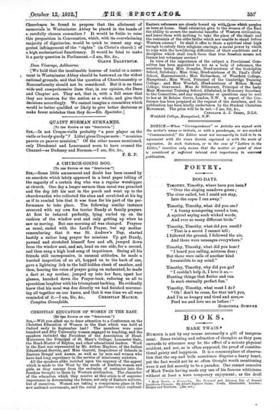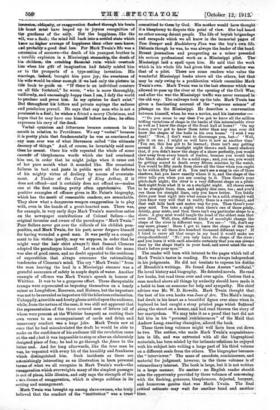BOOKS.
MARK TWAIN.*
HUMOUR is not by any means necessarily a gift of tempera. meat. Some twisting and refraction of thoughts as they pass onwards to utterance may be the effect of a minute physical accident, and not, as is often supposed, the proof of constitu- tional gaiety and happiness. It is a commonplace of observe- tion that the cap and bells sometimes disguise a heavy heart, yet the fact would not be so often thought worth mentioning were it not felt secretly to be a paradox. One cannot conceive of Mark Twain having made any one of his famous witticisms without at least a keen temporary enjoyment ; as the droll • -Mark Drain a Vograrhy. The Personal and Literary Life of Samuel Langhorne Clemens. By Albert Bigelow Paine, 3 vols. Illustrated. London; Harper and nrothers. [24s. net.] inveraioni obliquity,_ or exaggeration-lashed through his-brain hie heart mast have leaped up in joyous recognition of the goodnesa of the sally. But the happiness, like the wit, was a flash; the mind fell back into &settled state whioh knew no higher average of ha,ppinesi than other men. know; arid probably a good deal less. For Itfitrk Twain's-life was a stleetasion of sorrows—tbe death of his youngest brother in a terrible explosion in a Mississippi steamship, the death of his &admit, the net:Ishii:1g financial ruin which. ostertook him when his gift of imagination had fatally misled him as to the prospects of a type-setting invention; His marriage, indeed, brought him pure joy; the sweetness of his wife-would backer. enough if we had only the picture in that book to- guide rat. "'If there is an individual creature on all this footstool," he wrote, "who is more thoroughly, uniformly, and unceasingly happy than I am, I defy the world to produce and prose him. In my opinion he don't exist." But tbrinaghotat hitt fetters and private sayings the sadness- and pessimism prevail. He says that any man who is not a pessimist is -a-fool; he wishes a friend a merry Christmas, and hopes that he may have one himself before he dies; he often expresses his envy of the-dead, Verbal cynicism and .bitterness became common in his :mouth in relation to Providence. We say "verbal" because it is pretty plain that fundamentally he was as convinced as any man ever was of what Stevenson called "the ultimate decency of things." And, of course, he invariably said more than he meant. Once his wife repeated the whole of some cascade of blasphemous words which she had overheard him use, in order, that, he might judge when it came out of her pure mouth what it sounded like. His occasional failures in tact and jaste in public were all the defects of his mighty virtue of drollery_ by means of overstate- ment. A Yankee at the Court of King Arthur, if it does not offend—and it certainly does not offend us—makes one at the first reading pretty often apprehensive. The positive examples of offence given in Mr. Paine's biography, which has the.merit of reasonable candour, are remarkable. They show what a dangerous weapon exaggeration is to play -with, even in the hands of a great-hearted man. There was, for example, in very early days Mark Twain's merciless satire on the newspaper contributions of Colonel Sellers — the original inventor and owner of the pseudonym " Mark Twain." Poor Sellers never got over the ridicule of his childish pom- posities, and.Mark Twain, for his park never forgave himself for having wounded a good man. It was partly as a compli- ment to his victim (partly, may we suppose, in order that he might wear the hair shirt always ?) that Samuel Clemens adopted the pseudonym himself. Let us add that the name was also of good omen, and no doubt appealed to the residuum of superstition that always overcame the rationalizing tendencies of Clemens's mind. The cry " Mark Twain ! " from the man heaving the lead in a Mississippi steamer was a grateful assurance of safety in ample depth of water. Another example of offence was Mark Twain's speech in honour of Whittier. It was to be a gorgeous effort. Three disreputable tramps were represented as imposing themselves on a lonely miner as Longfellow, Emerson, and Holmes, but the imposture was not to be revealed as imposture till the hilarious culmination. Unhappily, a terrible and frosty gloom settled upon the audience, while, from the nature of the case, it was still not apparent that the representation of the three revered men of letters (all of whom were present at the Whittier banquet) as reciting their own verses to an accompaniment of cards and drink and unsavoury conduct vets a huge joke. Mark Twain saw at once that he had miscalculated the draft be would be able to make on the confidence of his audience till the revelation came at the end p but it was impossible, to stop or alter an elaborately designed piece of fun; he had to go through the fiasco to the bitter end.- And for long afterwards, like the true man he was, he-repented with every bit of the humility and frankness which. distinguished him. Such incidents as these are astonishingly interesting as an illustration in keen personal terms of what we all recognize in Mark Twain's work—the exaggeration-which overweights many of the simplest passages is out of place, kills illusion, and only saps the strength of the II ilia theme of exaggeration, which is always sublime in its setting and management.
Mark Twain- was brought up among slave-owners, who truly believed that the conduct of the "institution" was a trust. committed to them- by God. His mother would have thought • it a blasphemy to dispute this point of view. She had beard• no other among decent people. The life of boyish brigandage and escapade which we all know in the immortal pages of
Tons Sawyer and- Huckleberry Finn was the boy's own life.
Delicate though he was, he was always the leader of the band. Errant journalism and prospecting as a miner preceded hls serious professional work as. a Mississippi pilot. The Mississippi laid a spell upon him. He said that the work which in his whole life had given him most satisfaction was that of a- pilot. There are some readers who value the wonderful Mississippi books above all the others, but that may be only owing to a predilection which resembles Mark Twain's own. Mark Twain was in. the last steamer -which was allowed to pass up the river at the opening of the Civil War, and after the war the Mississippi traffic was never resumed 'in • the old- way. The railways took up the tale. Mark Twain has
given a fascinating account of the " supreme science" of pilotage on the Mississippi. He describes a conversation between himself, when he was a novice, and his instructor
"' Do you mean to- say that- I've got to know all the million trifling variations of shape in the banks of this interminable river as well as I know the shape of the front hall at home ? " On my honor, you've got to know them better than any man ever did know the shapes of the halls in his own house.' I wish I was dead !"Now, I don't want to discourage you, but—" Well, pile it on me ; I might as well have it now as another time.' ' You see, this has got to be learned ; there isn't any getting around it. A clear starlight night throws such heavy shadows that, if you didn't know the shape of a shore perfectly, you would claw away from every bunch of timber, because you would take the 'black shadow of it for a solid cape ; and, you see, you would be getting scared to death every fifteen minutes by the watch. You would be fifty yards from shore all the time when you ought to be within fifty feet of it. You can't see a snag in one of those shadows, but you know exactly where it is, and the shape of the river tells you when you are coming to it. Then there's your pitch-dark night ; the river is a very different shape on a pitch- dark night from what it is on a starlight night. All shores seem to be straight lines, then, and mighty dim ones, too ; and you'd run them for straight lines, only you know better. You boldly drive your boat right into what seems to be a solid, straight wall (you know very well that in realit, there is a curve there), and that wall falls back and makes way for you. Then there's your gray mist. You take a night when there's one of these grisly, drizzly, gray mists, and then there isn't any particular shape to a , shore. A gray mist would tangle the head of the oldest man that ever lived. Well, then, different kinds of moonlight change the shape of the river in different ways. You see—' Oh, don't say any more, please ! Have I got to learn the shape of the river according to all these five hundred thousand different ways ? If I tried to carry all that cargo in my head it would make me stoop-shouldered." No ! you only learn the shape of the river ; and you learn it with such absolute certainty that you can. always steer by the shape that's in your head, and never mind the one that's before your eyes.'" The reader will turn with interest to the pages which tell of Mark Twain's tastes in reading. He was always independent in his judgments. He did not hesitate to express his dislike of Meredith's writings. He found Jane Austen " artificial." He loved history and biography. He detested novels. He read few books, but read them over and over again. Curious that a man marked above all things by audacity should have made it a habit to lean on someone for help and sympathy. His chief adviser was Mr. W. D. Howells. Mark Twain thought that the best of his own books was Joan of Arc. The Maid's image had dwelt in his heart as a beautiful figure ever since when in boyhood he had caught a stray printed page which fluttered - along the street on a Ireeze, and had read thereon the story of her martyrdom. We may take it as a proof that tact did not
fail him in his "personal reminiscences" of the Maid that Andrew Lang, exacting champion, adored the book.
These three long volumes might well have been cut down to two. The author, who made Mark Twain's acquaintance .
late in life, and was entrusted with all the biographical materials, has been misled by the intimate relations he enjoyed with his subject into writing a large part of his third volume on a different scale from the others. The biographer becomes the " interviewer." The mass of anecdote, reminiscence, and material for judgment, however, in the three volumes- is of extraordinary interest. The book is large, but it is not written in a large manner. No matter : no English reader should miss the opportunity provided by these volumes of conversing with the flashing, generous, blasphemous, dejected, buoyant, and humorous- genius that was Mark Twain. The final critical estimate may wait for another hand and another time.











































 Previous page
Previous page